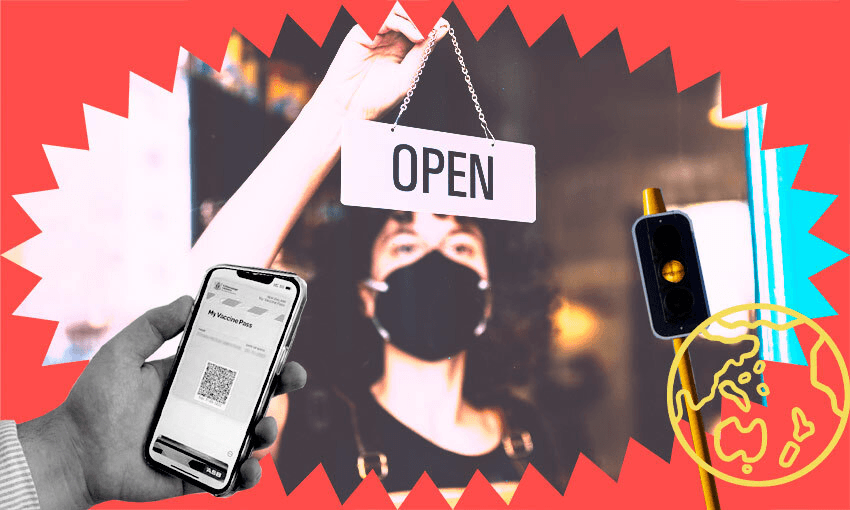From midnight tonight, Aotearoa shifts into the traffic light system, bringing a raft of changes for restaurants across the country. Charlotte Muru-Lanning talks to owners and staff about how they’re feeling and how they’re preparing.
Alex Davies, who runs Christchurch restaurant Gatherings, made the decision last week to explain via social media how the restaurant will manage the shift to the orange setting of the Covid-19 protection framework. The homepage of the restaurant’s website outlines exactly what customers can expect when dining there.
They’re going above and beyond the precautions set out by the government: customers will be asked to wait outside until staff have scanned and verified their vaccine passes against another form of ID, staff will be wearing masks and customers will enter and exit from different doors. They acknowledged how “strange and draconian this sounds”.
So far, the response from customers, Davies says, has been overwhelmingly positive. “It was about preparing our guests for what was inevitable and putting them in the mindset that this is happening.”
He says he’s not seen many others in the industry providing explicit information for customers on what the process will be and hopes to lead by example.
Gatherings has made the decision to check vaccine passports outside the restaurant because of the nature of the space inside – it’s small, with seating for only around 20 people. “It’s a bit different from a restaurant that seats 100 people, where people can walk in and they have a little bar or greeting or reception area where they can engage – we don’t have that,” says Davies.
“People are suddenly gonna be here. If we haven’t got a good plan together, we’re not going to be able to cope very well with it.”
For staff too, it’s a relief to know exactly what the system will look like as they shift to the orange light, especially because of the specific risk Covid-19 poses to those who work in cafes, restaurants and bars. “We’re in a very forward-facing industry and we’re dealing with people’s used plates and used cutlery,” says Davies. “We are a vulnerable group.
“I see that through friends in restaurants overseas, how vulnerable we are,” he adds. “A lot of them keep going down sick because of it, so the fact there is a framework there to protect us is vital, because we are going to be exposed to this.”
Davies has immediate family with asthma and says, “I want to protect them – I would hate to be responsible for bringing that sickness into my home.”
Wellington bartender Meredith* is cautiously positive about the shift to the traffic light system. “I’m really excited about the uptick in customers we’re going to get,” she says, but “at the same time, I’m also sort of worried”.
The move to orange in Wellington will mean hospitality venues will be able to operate as normal (masks and capacity restrictions are not mandated) as long as vaccine passes are used.
The restaurant Meredith works at is well prepared to manage the new system, she says. While she’s pleased to have the layer of protection that having fully vaccinated customers provides, she’s worried that as restrictions fall away, the chances of transmission will increase, especially because there’s still a chance of spread among fully vaccinated staff and customers.
“I’m still a bit concerned,” she says, “because especially as hospo workers, we’re some of the most exposed.”
Because she’s immunocompromised, Meredith will continue masking up, despite masks not being mandated for workers or customers at orange. “I’m seeing hundreds of people a day, that’s hundreds of chances for transmission.”
She also has some concerns about the response from customers asked to show their vaccine passes. “Lots of people will be unaware or unprepared for the shift to vaccine passports and the frontline hospo workers will be the ones being abused for that,” she says.
“People who are angry at the government’s new rules will be directing a lot of that anger at us, the low-paid workers with literally no power over the situation.”
Auckland front-of-house restaurant worker Avi* has worked in hospitality for more than a decade and agrees that the new system will likely mean low-paid workers dealing with more abuse than normal.
“The kind of abuse faced as a worker comes from the fact that there’s a massive asymmetry in power,” she says.
While she’s certain the vaccine pass system and mask mandates will take some getting used to for diners, she’s relieved it provides clear expectations of customers and sets out rights for those working in restaurants. Outside of Covid restrictions, there are very few parameters around how to treat staff or the rights of staff when it comes to responding to rude or aggressive customers.
“Finally, there’s a boundary or policy in place for keeping staff safe,” she says.
“Honestly, it’s still a little scary, because someone could easily bring Covid in the restaurant,” she says. “You’d have to be crazy if you’re not nervous about that.”
For Avi, dining out is part of what makes Auckland so special, so she’s celebrating the cautious reopening of dine-in restaurants around the city – something Aucklanders have gone without for four months.
“People who love the hospitality industry and choose it as a career love to make people happy and love running around during the busy service and smiling and laughing – it’s a really good feeling.”
Alex Davies hopes those in the hospitality industry operate responsibly under the traffic light system with the aim of keeping people safe during the pandemic, especially because looking after people is the very definition of hospitality.
“If you’re working within the realm of hospitality, you’re working within an ethic of care, and an ethic of care extends beyond just caring for people for monetary value – it also cares about people’s health.”
* Meredith and Avi asked that their surnames not be used.





